Echinacea pallida
pale purple coneflower
A perennial species, about 1.2m tall, with hairy linear mid-green leaves. Distinctive pale pink flowers with long and linear ray petals, reflexed to droop down, surround a central orange-brown cone and appear from midsummer to early autumn. A great choice for prairie planting
Size
Ultimate height
1–1.5 metresTime to ultimate height
2–5 yearsUltimate spread
0.1–0.5 metresGrowing conditions
Moisture
Well–drainedpH
Acid, Alkaline, NeutralColour & scent
| Stem | Flower | Foliage | Fruit | |
| Spring | Green | |||
|---|---|---|---|---|
| Summer | Pink | Green | ||
| Autumn | Pink | Green | ||
| Winter |
Position
- Full sun
Aspect
South–facing or West–facing
Exposure
Exposed or Sheltered Hardiness
H5Botanical details
- Family
- Asteraceae
- Native to GB / Ireland
- No
- Foliage
- Deciduous
- Habit
- Clump forming
- Genus
Echinacea are erect, clump-forming rhizomatous perennials with simple or pinnately lobed leaves and solitary, long-stalked daisies with prominent conical central disks and often drooping ray florets; attractive to butterflies
- Name status
Correct
- Plant range
- E North America
How to grow
Cultivation
Grow in well-drained, humus-rich soil ideally in full sun with protection from excessive winter wet. See echinacea cultivation
Propagation
Propagate by seed sown at 13°C in spring. Propagate by division in spring or autumn although they resent disturbance. Propagate by root cuttings from late autumn to early winter
Suggested planting locations and garden types
- Cottage and informal garden
- Wildflower meadow
- Prairie planting
- Wildlife gardens
- City and courtyard gardens
- Coastal
- Patio and container plants
- Gravel garden
- Cut flowers
- Flower borders and beds
Pruning
Cutting back stems as the blooms fade may encourage further flowering; or seedheads may be kept on the plant for winter interest
Pests
Generally pest-free but young growth may be susceptible to slugs
Diseases
Generally disease-free
Love gardening
Sign up to receive regular gardening tips, inspiration, offers and more
View our Privacy Policy
Get involved
The Royal Horticultural Society is the UK’s leading gardening charity. We aim to enrich everyone’s life through plants, and make the UK a greener and more beautiful place.
